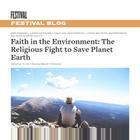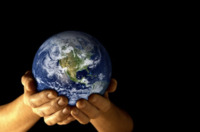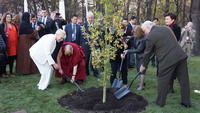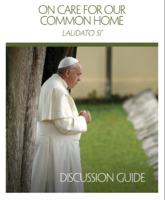Search
20 items
-
Faith in the Environment: The Religious Fight to Save Planet Earth
An article discussing the interfaith panel “Ways of Knowing, Ways of Living: Exploring Faith and Conservation” at the 2022 Smithsonian Folklife Festival. The author introduces the four panelists, their faiths, and their respective perspectives on encouraging intersections of faith and environmentalism, with Imam Saffet Abid Catovic representing Muslim faith, Jakir Manela representing Jewish faith, Michael Nephew representing Native American faiths, and Dr. Rachel Lamb representing (Evangelical) Christian faith. -
The Great Global Cleanup
This toolkit is intended to help guide people and groups on how to start and execute a cleanup project to restore communities.
"Follow our simple guide to make the most out of your cleanup. If you need any help, reach out to us at info@earthday.org." -
Evolution of the Collective Unconscious
"The collective unconscious is made up of experiential knowledge, symbols, and imagery that humans are naturally born with (no tabula rasa) and are rooted in ancestral experience and shared by all persons in all cultures. After millennia of evolution, the current collective unconscious of humanity would seem to include human exceptionalism, patriarchal hegemony, short-terminism, delusions of grandeur, illusions of unending growth, and the idolatry of technology. As the planet becomes overloaded with industrial civilization, our collective mindset seems to be unwilling to think long-term and face the realities of ecological overshoot. It remains to be seen whether our collective mindset can evolve to voluntarily refocus human agency toward contraction of the human enterprise, simplification of lifestyles, and peaceful resolution of conflicts before it is too late to prevent a chaotic collapse of industrial civilization." -
Why Conservative Christians Don’t Believe in Climate Change
"American Christians have become increasingly polarized on issues of climate change and environmental regulation. In recent years, mainline Protestant denominations and the Roman Catholic Church have made explicit declarations of support for global climate action. Prominent Southern Baptists and other evangelical Protestants, on the other hand, have issued statements that are strikingly similar to the talking points of secular climate skeptics, and have attempted to stamp out 'green' efforts within their own ranks. An analysis of resolutions and campaigns by evangelicals over the past 40 years shows that anti-environmentalism within conservative Christianity stems from fears that 'stewardship' of God's creation is drifting toward
neo-pagan nature worship, and from apocalyptic beliefs about 'end times' that make it pointless to worry about global warming. As the climate crisis deepens, the moral authority of Christian leaders and organizations may play a decisive role in swaying public policy toward (or away from) action to mitigate global warming." -
Taoist monks find new role as environmentalists
This article details the efforts of Taoist leaders in China to incorporate sustainability in Taoist temples and promote a culture of environmentalism. Since 2006, the Daoist Ecological Protection Network has gained the support of 120 temples who have converted to the use of solar panels and biofuels. Taoist monks noticed many people to be ignorant towards their environmental impact, living a life of hyper-materialism. Monks wanted to help educate society about the actions that can be taken to ameliorate environmental issues both at the temples and in daily life. This pursuit is driven by a fundamental belief in Taoism to live in harmony with nature, a value that could have large impacts on society if adopted. -
Turning Around Our Relationship with Earth is a Teshuvah Project
The author recounts an unsettling encounter with a utility worker who downplayed the environmental harm of her gas leak. From here, she explains the true negative impacts of methane emissions on both people and the climate, and encourages us to act in a way that "turns around our relationship with Earth". She connects this with the Jewish tradition of Teshuvah, the time in between Rosh Hashanah and Yom Kuppur meant for repentance. -
Al-Mizan: Covenant for the Earth
"The Covenant presents an Islamic outlook on the environment in a bid to strengthen local, regional, and international actions to combat the triple planetary crises defined by the United Nations as climate change, biodiversity loss and pollution. It is a global endeavour to engage Muslims from all levels of society in the development and adoption of this call...
Al-Mizan - A Covenant for the Earth is a restatement of the principles governing the protection of nature in a form that meets current challenges. It examines the ethics behind the social patterning of human existence and enquires into how they could be brought to life today working in harmony with the heartbeat of the natural world." -
Rising: Dispatches from the New American Shore
This resource contains a series of vignettes following Elizabeth Rush as she meets people all around American who have been affected in some way by global sea rising, as well as some of her own personal experiences. She gives voice to those otherwise not heard, and shares eye opening testimonials from those who experience the effects firsthand. -
Religion and Environmental Values in America
"Religion and Environmental Values in America explores the emerging and increasingly important topic of religion and sustainability, with particular attention to first understanding what it takes, philosophically and practically, to overcome polarizing debates about such topics and to understand environmental issues at their roots. The book then examines a range of case studies highlighting key areas of faith-based sustainability solutions." -
Querida Amazonia
This post-synodal exhortation by Pope Francis draws and continues from Laudato Si'. It specifically addresses the region of the Amazon and Pope Francis' ideals for supporting its environment. In summation, he says, "I dream of an Amazon region that fights for the rights of the poor, the original peoples and the least of our brothers and sisters, where their voices can be heard and their dignity advanced.
I dream of an Amazon region that can preserve its distinctive cultural riches, where the beauty of our humanity shines forth in so many varied ways.
I dream of an Amazon region that can jealously preserve its overwhelming natural beauty and the superabundant life teeming in its rivers and forests.
I dream of Christian communities capable of generous commitment, incarnate in the Amazon region, and giving the Church new faces with Amazonian features." -
Querida Amazonia Beloved Amazon Study Guide on Select Themes
"This reflection/discussion guide, for use with Pope Francis’ apostolic exhortation, Querida
Amazonia [Beloved Amazon], can help individuals and small groups explore and dialogue with
aspects of this important document related to listening to “the cry of the poor,” the rights of
indigenous persons, solidarity, and action to care for God’s creation. It does not cover all themes in
the apostolic exhortation. The guide includes a template for small group discussion, as well as
questions for either individual or small group reflection on particular themes in the document." -
Practical Steps Towards Protection of the Environment
"These days the environment- the source of life for all beings in the world including Tibet, the Land of Snows- is undergoing extensive degeneration. At this time it is extremely important that every human being, according to his or her ability, consistently puts effort into ensuring the conservation and protection of this planet's environment and its inhabitants." -
Hindu Faith Statement on the Environment
This statement consists of three sections reflecting the major strands of Hindu thought: Sustaining the Balance, Sacrifice and Protection, and Breaking the Family. It was compiled as a statement of the stance of the Hindu faith on environmental issues and how to approach nature. -
"Tell the EPA"
This email was sent out on the Interfaith Power and Light newletter asking for support in limiting coal ash pollution. It asks readers to reach out to the EPA to advocate in favor of stricter guidelines for coal burning power plants to clean up the pollution that is produced. -
President Carter’s Environmental Roots
This chapter from the student-written book “Emerging Perspectives on Religion and Environmental Values in America” explores the environmental history and values of former President Carter. It discusses how Carter's religion impacted his environmental views and how he acted on those values during his career. Below is the first paragraph of the chapter to introduce the discussion.
"Former President Carter, the peanut farmer turned president, has a long and well-known record. He’s been everything from a farmer, navy man, state senator, then Governor of Georgia, President of the United States, Noble Peace Prize winner, and bible study teacher. What’s not as recognized as his noble peace prize winning post-presidency, or his political career, is his strong environmental policies. In his 4 years in the White House, President Carter did more for the environment than many presidents before and after him. He faced many challenges throughout his presidency, most notably the hostage crisis, and the energy crisis. These major challenges in his tenure have hogged much of the attention of his presidency, and people seem to forget his message of good environmental attitudes. The question is, where did his environmental attitudes come from?" -
An Unfamiliar Outlook: The Partnership of Ecofeminism and Daoism
This chapter from the student-written book “Emerging Perspectives on Religion and Environmental Values in America” explores the interactions between Daoism and environmentalism, feminism and environmentalism, and Daoism and feminism. The history of these philosophies are explored and the author includes her own experiences and thoughts to help discuss the perspective. Below is the first paragraph of the chapter to introduce the discussion.
"It’s not clear how many Daoist ecofeminists are in the world, but I think I may be one of them. Though I was raised as a Baptist Christian, I have found the insights of Daoism, the predominant religion of the homeland of my family, and ecofeminism, the perspective that centers women’s relationship to nature, as complementary to my Christian faith and concern for the environment. I have been able to incorporate this philosophy into my life and found that they are interrelated. My interest in these thoughts was partly sparked by applying to the China Program summer internship with Environmental Defense Fund (EDF), which piqued my interest in learning more about Chinese cultural beliefs. Daoism has played a huge role as a philosophy within Chinese culture for thousands of years, and I am interested in ecofeminism because it is a topic that strongly resonates with me being a woman and its relation to the earth. As someone who grew up having a spiritual and personal relationship with the natural world, I find that many of my values align with the Daoist ecofeminist perspective." -
Earth Friendly Habits: Putting Your Catholic Faith into Action
"We all want to have clean air and water. We all want to leave a healthy planet for our children and grandchildren but the challenges we face can feel overwhelming. This booklet will guide us in the process of creating earth friendly habits. Every week it will feature a quote from a saint, Pope Francis, or Laudato Si’, the encyclical written by Pope Francis, along with a simple idea to consider implementing. Often, there will be information about why we need these changes. Some ideas will be familiar but are worth revisiting. Some will be new. The suggestions might appear small but once enough people act in their own lives, it will start a chain reaction that can only end in a healthier planet Earth. Many of the ideas cost nothing. Some require a small initial investment but will save money in the long run. These steps can improve the environment over the course of a lifetime. Spend some time each week thinking about implementing the suggestion. Learn and adopt strategies that work for you." -
In Minnesota they’re paying homeowners to replace lawns with bee-friendly wild flowers
"Minnesota lawmakers set aside $900K to assist homeowners convert traditional lawns by planting wildflowers, clover and native grasses in an effort to slow the collapse of the state’s bee population." -
Laudato Si' Discussion Guide
"Pope Francis’ encyclical letter Laudato Si’ was released in June 2015. Five years later, in 2020, Pope Francis invited all Catholics and people of good will to celebrate the fifth year anniversary of this important encyclical and to take action to better care for our common home. Also in 2020, Pope Francis issued an apostolic exhortation, Querida Amazonia [Beloved Amazon], which drew heavily from Laudato Si’ and from the reflections of participants in the Special Synod of Bishops for the Pan-Amazonian Region on October 6-27, 2019 on topics such as “the cry of the poor,” exploitation of the resources and the original peoples of the Amazon region, and action to care for God’s creation. The guide includes materials for prayer, reflection and discussion, as well as ideas to help Catholics respond to Pope Francis’ call in Laudato Si’. The discussion section of the guide includes quotes and discussion questions on a variety of themes highlighted in Laudato Si’. The facilitator should decide in advance which topics will be covered during this session. Given the number of rich themes on which Pope Francis focuses in Laudato Si’, you may wish to spread the topics among several sessions. A separate study guide for Querida Amazonia is also available." -
El Niño caused the greatest ever mass extinction
This article describes new updated research that shows the weather event El Niño has led to the worst mass extinction. El Niño causes the ocean to become warmer all leading back to climate change. Marine ecosystems and terrestrials are suffering greatly because of volcanic eruptions occurring. Mass extinctions are very damaging and mess up multiple ecosystems causing more destructiveness than we realize.




















